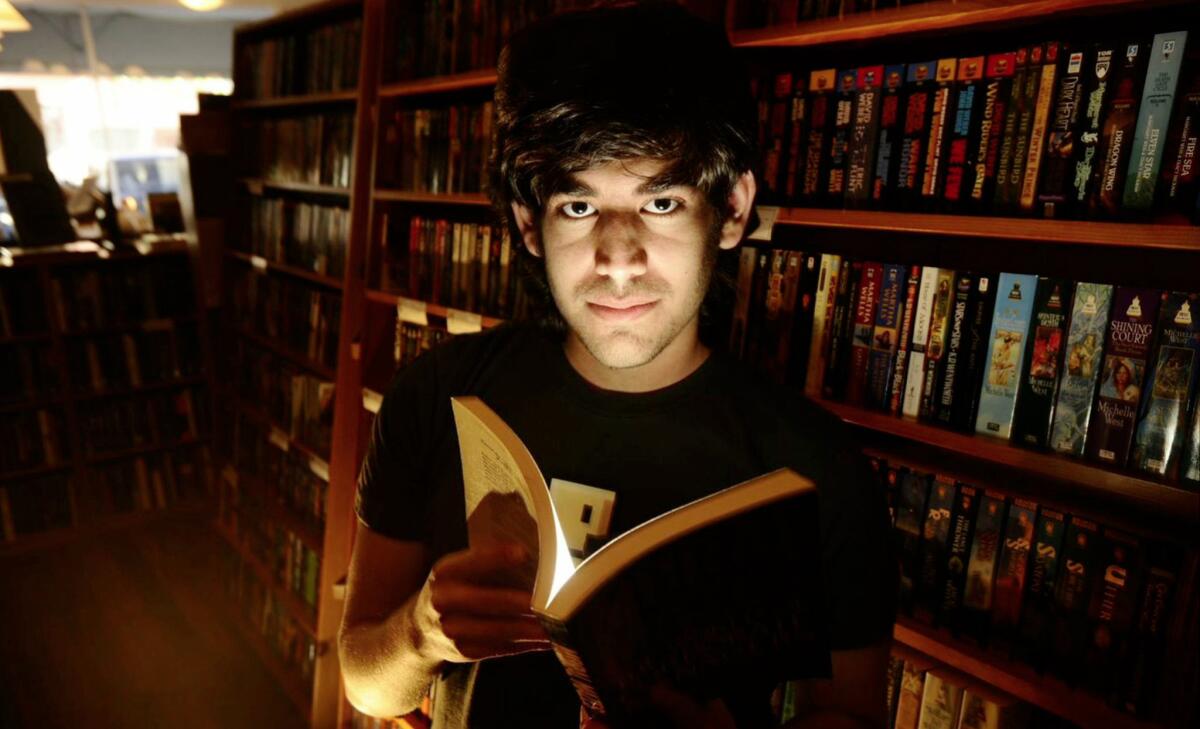Tragic story of a true believer in ‘The Internet’s Own Boy’

- Share via
“The Internet’s Own Boy: The Story of Aaron Swartz” is an unemotional title for a moving documentary that will leave you heartsick as well as more than a little angry. Whether Aaron Swartz is a personal hero or someone you’ve never heard of until now, his story cannot help but touch you.
Smartly directed by Brian Knappenberger, “The Internet’s Own Boy” starts the only place it can. That would be Jan. 11, 2013, when its subject, a celebrated and influential computer prodigy who was facing federal felony charges that could have meant 35 years in prison and a $1-million fine, took his own life at age 26.
Swartz’s death shocked the Internet community for a pair of interlocking reasons: the nature of this young man’s goals and how they intersected with the aims and tactics of U.S. prosecutors who, the film contends, exhibited considerably more zeal than sense. “Governments,” explains U.S. Rep. Zoe Lofgren, a Swartz partisan, “have an insatiable desire to control.”
A player in the development of Web format RSS and one of the developers of Reddit, Swartz was a millionaire before he was 21, but he turned his back on making money in general and start-up culture in particular.
“He felt programming was magic,” Aaron’s brother Ben explains. “If you had magical power, would you use it for doing good in the world or for making piles of money?” Swartz was someone who very much wanted to make a difference, an all-in individual who was uncompromisingly passionate about what he felt was right.
The film was made with the cooperation of Swartz’s family and friends and no help at all from the U.S. attorney’s office and MIT, the two entities that come off the worst in the film. Despite this lack, “The Internet’s Own Boy” paints a convincing picture of how its subject got into a predicament that one person aptly characterizes as something that would be “absurd if it wasn’t tragic.”
A naturally iconoclastic thinker who felt very strongly from an early age that “we should always be questioning everything,” Swartz was not big on received wisdom or respecting authority. It’s not for nothing that the film starts with a celebrated quote from Henry David Thoreau about unjust laws that proves to be prophetic, a quote that asks whether we should obey them and work for gradual change or transgress them at once.
Self-taught as a reader at age 3 and computer literate shortly after that, Swartz was the kind of prodigy who went to conferences and symposiums when he was still a young teen and got treated as a peer by the adult participants. As with many prodigies, he could be, as a friend says, “self-aware and ornery.”
One of the first things Swartz cared deeply about were issues of copyright and public access. He met Lawrence Lessig, became involved in the Creative Commons initiative and also took an active role in the fight to make it easier and less expensive for people without the means to use the government’s Public Access to Court Electronic Records or PACER service to see legal documents and thus access the law.
This interest led Swartz to a concern with JSTOR, short for journal storage, a system that charged steep fees for accessing scholarly journals: It offended him that for-profit corporations would in effect be controlling the world’s knowledge.
What Swartz did in 2010 was both simple and complex. Using access he got through MIT, he hacked into JSTOR and started downloading everything in sight. What Swartz’s goal was for all this information has never been clear, and the issues surrounding his actions are complex. But the government’s response, including an eventual total of 13 felony charges likely intended to make an example out of him, seemed to most observers to be excessive for what one friend called “downloading too many academic journal articles.”
In the middle of dealing with the government, Swartz still found time to take a key role in the grass-roots movement that stopped SOPA, the anti-piracy initiative that initially seemed assured of congressional passage. “He wanted to change the world in a major way,” a friend observed, “and this proved he could do it.”
Hearing from friends, family, colleagues and admirers makes it clear how unbearably sad it is that someone as young and gifted as Swartz felt compelled to take his own life. When you confront the system, the system is going to be compelled to fight back. “He was the Internet’s own boy,” says Quinn Norton, a close friend, “and the old world killed him.”
Twitter: @KennethTuran
------------------------------
‘The Internet’s Own Boy: The Story of Aaron Swartz’
No MPAA rating
Running time: 1 hour, 45 minutes
Playing: At Sundance Cinemas, West Hollywood
More to Read
Only good movies
Get the Indie Focus newsletter, Mark Olsen's weekly guide to the world of cinema.
You may occasionally receive promotional content from the Los Angeles Times.










